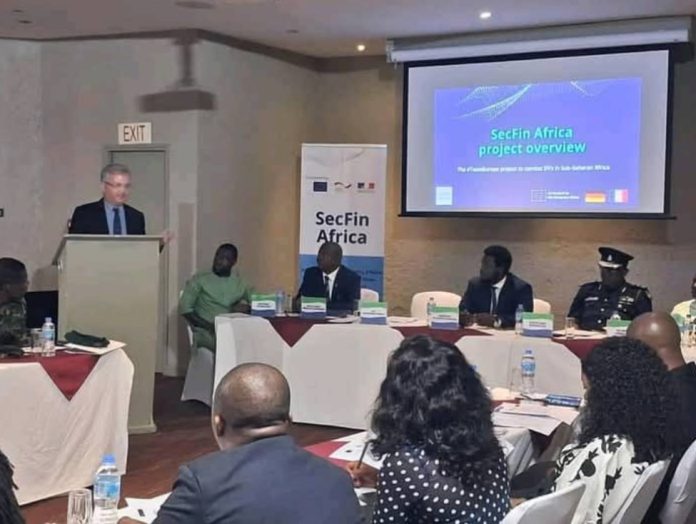In a concerted effort to strengthen Sierra Leone’s criminal justice system in the area of Anti-Money Laundering and Countering the Financing of Terrorism (AML/CFT), a two-week intensive training on financial investigations was officially launched on Monday June 16, 2025 at the Radisson Blu Hotel in Freetown.
The training is being delivered in collaboration with Sierra Leone’s Financial Intelligence Agency (FIA) under the European Union-funded SecFin Africa project, which aims to build institutional capacity and foster international cooperation in the fight against illicit financial flows.
The opening ceremony featured high-level national and international stakeholders. Statements were delivered by the Chairman of the event, Francis Ben Kaifala Esq., Commissioner of the Anti-Corruption Commission (ACC); David N. Bobor, Director General of the FIA; Abdallah Sesay Esq., Head of Legal Affairs and Information Cooperation at the FIA; Deputy Inspector General of Police, AIG Sahr Yomba Senesi; and Deputy National Security Coordinator, Ahmed A. Sannoh.
The keynote address and official opening were delivered on behalf of the Minister of Internal Affairs, Morie Lengor Esq., by the Ministry’s Permanent Secretary, Alfred Lahai.
Representing the European Union, Deputy Head of the EU Delegation to Sierra Leone, Emilio Rossetti, delivered a powerful address underscoring the urgency of addressing financial crime. He emphasized the devastating impact of illicit financial flows on national development.
“Illicit financial flows are corrosive forces that drain national budgets, fuel corruption and insecurity, and deprive people of the basic conditions for a dignified life,” Emilio Rossetti said. “They stem from serious crimes like corruption, drug trafficking, illegal trade, terrorism financing and tax evasion.”
Emilio Rossetti noted that Africa loses approximately $89 billion annually to illicit financial flows; an amount equivalent to total official development assistance and foreign direct investment combined. “These are stolen opportunities that could have built schools, hospitals, roads and power stations,” he lamented.
He highlighted the importance of robust AML/CFT frameworks, calling on Sierra Leonean institutions to enhance inter-agency coordination, improve enforcement capacities and increase the use of financial intelligence by law enforcement bodies.
Sierra Leone has made important progress, including the passage of the 2024 Anti-Money Laundering Act, which established the FIA as an autonomous entity. However, Emilio Rossetti also pointed out lingering vulnerabilities, such as a predominantly cash-based economy, porous borders and under-regulated sectors like real estate, casinos and precious metals trading.
The EU official urged for a significant increase in supervision and compliance, particularly among Designated Non-Financial Businesses and Professions (DNFBPs), which include lawyers, accountants, vehicle dealers and others. “The number of Suspicious Transaction Reports being filed remains low,” he said, “and there is an urgent need to strengthen oversight and ensure compliance.”
Emilio Rossetti also spoke of the importance of cross-border cooperation and Sierra Leone’s engagement with regional mechanisms such as GIABA (Inter-Governmental Action Group against Money Laundering in West Africa). He revealed that Sierra Leone remains under Enhanced Follow-Up by GIABA, with another assessment due in November 2025 and a mutual evaluation scheduled for 2027.
Emphasizing the transnational nature of money laundering and trafficking, Emilio Rossetti stated, “No single country can win this battle alone. It requires collaboration, intelligence-sharing and operational bridges between African and European law enforcement and judicial services.”
He highlighted several EU-supported initiatives, including:
• Support for national and regional databases to strengthen police information-sharing;
• Improved monitoring at ports;
• Multi-agency capability development (police, navy, customs, immigration);
• Cross-border joint actions;
• Legal and judicial system strengthening;
• Regional coordination through ECOWAS and other organizations.
A special focus was placed on the SecFin Africa programme, which officially launched its activities in Sierra Leone through this training.
The EU, along with Germany and France, is working to:
1. Strengthen the FIA and judiciary’s operational capacity;
2. Support Sierra Leone’s accession to the Egmont Group for international financial intelligence exchange;
3. Enhance cooperation across all segments of the AML/CFT enforcement chain;
4. Address high-risk sectors like real estate, mining and vehicle trading.
Concluding his address, Emilio Rossetti said, “This training is not only a launchpad for SecFin activities in Sierra Leone, but also a foundational investment in your capacity as investigators, analysts and trainers. On behalf of the European Union, I wish you a fruitful and enriching experience; one that will empower you to combat the crimes that are stealing the future of Sierra Leone’s children.”
The training is expected to significantly improve national competencies in financial investigation and inter-agency cooperation, setting a stronger foundation for Sierra Leone to tackle money laundering, terrorism financing and other serious financial crimes.

